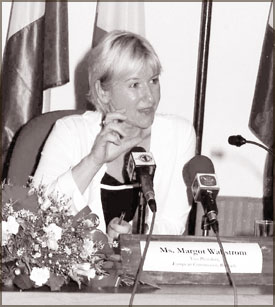|
DAILY NEWS ONLINE |
|
|
|
OTHER EDITIONS |
|
|
|
|
|
|
|
|
|
OTHER LINKS |
|
|
|
|
|
|
 |
Enter: a socially-conscious European Union
|
|
|
While the US led military alliance invades Iraq and ethno/religious strife is rife in Chechniya, Bosnia, Rwanda, Lithuania, Croatia, Serbia, Kashmir, Palestine and all else, twenty five European member states are moving into social development not only within its membership but worldwide as well.
Striking new ground, the European Union has broken all shackles and fetters that foster division and are into a more holistic approach.
Yes, the EU's citizenry are now free of restrictions that once compartmentalised these chained communities living up to French thinker Jean Jacques Rousseau who observed, "Man is everywhere in chains".
Truly the EU's populace now enjoy restriction-free travel carrying common currency - a prelude to future stability and prosperity.
Elaborating on all this recently at the BCIS was the European Commission's Vice President Margot Wallstrom.
"We of the European Union have ended the East/West divide and have consolidated democracy and economic reform.
The EU is into social policies through democratic working and stand for democracy, rule of law, human rights and the market economy and are working towards a socially cohesive and peaceful world. We of the EU also want Sri Lanka to adopt such and be a showcase to the world," she said.
The European Union's efforts are not confined to domestic territory alone and hopefully guarantee democracy even beyond to the Middle-East and other troubled spots to meet the UN's Millennium Development Goals. In fact the EU intends being leading partner for sustainable development and social justice.
Wallstrom also viewed poverty and seclusion as colossal economic and social waste which factors she said contributed to international terrorism. What's most striking about the European Union is its concern more towards eliminating the root causes of terrorism than fighting terrorism per se.
Domination and control being not even the least concern of the EU, she categorically stated the EU's desire for partnership and negotiation to arrive at stability which she saw would comprise a common future - its driving ethos being a cosmopolitan one with basic universal rights.
"We do not want to be made as same nor impose cultural norms on each other," she said that reminded this writer of an endeavour to reaching out to universality amid plurality.
Wallstrom reflecting on the days of colonialism said:
"For Europe it is shameful to reflect upon the colonial legacy..." and added how it had left room for contact and cultural exchange.
Seeing the need for a modernised vision to meet future challenges, she called for a change in the democratic working method and even suggested federalism as a solution to the present Sri Lankan crisis.
For political projects to be successful, she said, it must be relevant to citizens and unfailingly expressed the need for transformation in trade development and international relations.
Reaching out to ethnics and morality, Wallstrom emphatically stated the need for democracy to be in all our actions whereby respect for all is arrived at. People need to be listened to and demand to be involved and respected. "Any solution should be a sustainable model where people take responsibility," she informed.
Reminiscing on the scourge of war Wallstrom spoke of its futility as was Europe's experience.
"I come from a war ravaged continent where peace was thought to be impossible but for today's generation of Europeans, wars seem laughable. This is important for a country like Sri Lanka," she reminded.
Her advice to replace aggression with negotiation, which she said was what the EU is successfully implementing, both economically and politically - certainly is emulation worthy by countries embroiled in ethno/religious wars.
In an attempt to bring about what she best described as transnational governance, Wallstrom saw the EU's aim of fighting poverty, crime, seclusion, organised crime, drug trafficking, environmental issues, and cross border problems as the best way out for social development.
The fruits of economic growth, she said, must benefit all and towards this end the EU will work. Her assurance is amply demonstrated in the EU granting 49 less developed countries free access to its market in 2001.
Being the world's biggest trader the EU sees the need for effective sustainability in effective trade. Sri Lanka will also benefit from the EU's preferential trading system.
Already Sri Lanka is recipient of over 210 million Euros (1976); 50 million Euros at the Tokyo donor conference to help the peace process, 30 million Euros for tsunami victims and an additional 100 million Euros for reconstruction. Looking at aid and procurement with disdain she spoke of the EU's conditionless aid delivery.
"We of the EU want a holistic approach when giving aid," she added.
Indeed with the emerging European Union it is certainly the best of times amidst the worst - of wars, crime, drugs and what not.
|
|

